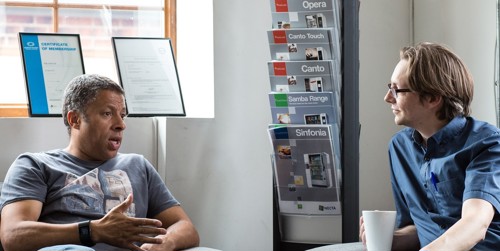Employing graduates; recruitment, onboarding and induction

1. Recruitment
Recruitment can be hard for graduates. They may have applied for many jobs and not had any response. A simple standard email to acknowledge receipt of an application could make all the difference.
There is evidence that applicants deselect themselves because they assume you will be looking for someone with a high degree classification from a ‘top’ university. Gender, class, race and disability (including mental ill-health) can all play a part in this. Make sure you take action to combat this.
2. Interviews
Is the interview process designed to get the best from your candidate, including those who experience anxiety or other mental health difficulties? Or those from different cultures? It is important to be proactive in taking steps to address this in order to create a level playing field for all candidates.
- Send out as much information as possible about the process beforehand.
- If the interview is being held online, it is a good idea to go through the technical side of this before the actual interview. This will help allay anxiety and ensure that it all runs smoothly.
- Provide an opportunity for the candidate to talk about any mental health difficulties they might be experiencing before the interview so appropriate adjustments can be made. Remember that this will take courage and might be very difficult for the candidate.
3. Onboarding
This is an important process in helping the new employee settle in. This can begin before day one with information, social media and opportunities to ‘meet’ other new starters beforehand. The more work you put in at this stage, the easier the transition will be. Starting work will be less of a step into the unknown, with all the fears, anxieties and insecurities that might bring.
4. Induction
It is important to start talking about mental health and wellbeing right from the start. This isn’t just telling people about your workplace wellbeing initiatives. It is also about creating a culture and environment where people feel safe to talk about their mental health. Especially if they are starting to struggle.
It’s useful to pre-empt anxieties about practical issues which are likely to impact on mental health, such as:
- Loneliness. Many new graduate employees may have just moved to the area. In the 2019 Milkround report, 50% were worried they wouldn’t make any friends.
- Debt and money problems. This may be a tough time for your new graduates, especially until they get their first month’s pay. Think about having a system in place to support this and ensure it’s easy to raise this with you without shame or embarrassment.
- Fear of not fitting in. It can be very daunting entering a new company culture. This may be especially so for many people due to race, gender, ethnicity, sexuality, disability (including non-visible disabilities such as dyslexia) or neurodiversity. Evidence shows that people from these groups are more likely to experience mental health difficulties at work. Putting in place steps right from the start to be inclusive can help stop this.
If there are work social gatherings, make all your young employees feel welcome. Take care to make these as inclusive as possible.
- Finding somewhere to live. Is there anything you can do to help with this?
Further suggestions
- Support systems to help your graduates settle in; a buddy or mentor, as well as a line manager, can help with this. A buddy might be someone who has recently been a new graduate employee, who can show them the ropes and be a friendly point of contact
- Open communication and feedback; this is something that is important to your Gen Z employee. It is important to set clear targets and give lots of opportunity for feedback. Addressing issues like perfectionism and presenteeism at this point may also be helpful
- Flexible working; this has also been something which Gen Zs value. Coronavirus has shown how effective it can be and demonstrated that, for example, working from home does not reduce productivity. Thinking creatively about whether this is a possibility could be beneficial all round. It is important, as always, to balance the needs of the employee against the needs of the business and be clear about this
- Training and opportunities for development; this has been identified as something which is important for new graduates. They have come from a learning environment so helping them increase their skills will keep them motivated and engaged. It will also make them feel valued
How to give supportive feedback
The transition into full-time ‘graduate’ employment can be daunting and difficult. Remember how it was for you. There can be a whole range of new life skills to learn as well as getting used to a new role in a new company and wanting to make a good impression. Being proactive in protecting mental wellbeing in the early stages plays an important part in helping your graduates (and other young people) settle into work and start to thrive. It is also important to keep this support going and not let it drop as soon as the induction period is over.
Resources
Was this article helpful?
Your feedback helps us create better content so if this article helped, please leave a like below and let others know.
The Charlie Waller Trust
The Charlie Waller Trust is a registered charity in England and Wales 1109984. A company limited by guarantee. Registered company in England and Wales 5447902. Registered address: The Charlie Waller Trust, First Floor, 23 Kingfisher Court, Newbury, Berkshire, RG14 5SJ.
Copyright © 2024 The Charlie Waller Trust. All rights reserved.




